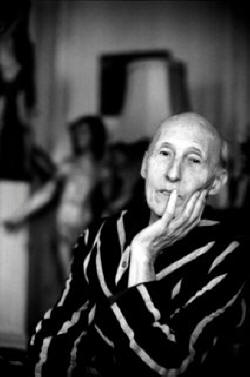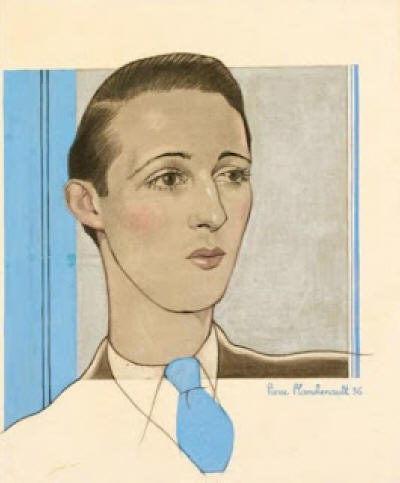

Queer Places:
266 Bd Saint-Germain, 75007 Paris, France
 Jacques de Ricaumont (July 8, 1913 - January 1, 1996) was a French writer.
Known for his far-right views, he is the co-founder of the homophile group Arcadia, and the founder of the Cercle Montherlant.
In 1946, André Baudry began frequenting a circle of conservative Catholic
homosexual writers that included Roger Peyrefitte,
André du Dognon, and
Jacques de Ricaumont. Ricaumont was one of the founders of Arcadia with André
Baudry, who had met him through André du Dognon.
Jacques de Ricaumont (July 8, 1913 - January 1, 1996) was a French writer.
Known for his far-right views, he is the co-founder of the homophile group Arcadia, and the founder of the Cercle Montherlant.
In 1946, André Baudry began frequenting a circle of conservative Catholic
homosexual writers that included Roger Peyrefitte,
André du Dognon, and
Jacques de Ricaumont. Ricaumont was one of the founders of Arcadia with André
Baudry, who had met him through André du Dognon.
Jacques de Mieulet de Ricaumont, born July 8, 1913 in Romans (Deux-Sèvres), was from the family of Mieulet de Ricaumont, originally from Languedoc, ennobled in 1684 as capitoul of Toulouse. Born into the small nobility of the South-West, Ricaumont arrived in Paris in the early 1930s, where he met Dognon. A portrait signed Nicolas de Staël and entitled Mademoiselle de Ricaumont shows an effeminate creature, carefully made up, eyebrows depilated, pouting. Du Dognon and Ricaumont had some adventures with German soldiers during the war, the story of which can be found in the second novel published by Du Dognon, Le Monde inversé (1949). Missing the Germans after 1945, Ricaumont was appointed press correspondent in Berlin, where he found himself at the center of a small scandal when a French newspaper revealed his affair with a descendant of Bismarck. Despite his taste for provocation – he liked to tell that to a German officer under the Occupation describing him as an "excellent friend" of the Germans, he would have replied "only young Germans" – Ricaumont tried to do more respectability after 1945. He did not like at all to appear – under the name of Phili – as the main character in the scandalous first novel of André du Dognon, who reveals his real name in the dedication, giving him the title of Grand Master of the Order. He even considered prosecution of the author, and the dedication was withdrawn in subsequent editions. His passions were aristocracy, the Church and the defense of "Greek love". He liked to associate with nobles, true or false. A member of Arcadia remembered attending a dinner at Ricaumont's, sitting between Prince John of Bourbon-Sicily and Prince Ernst-Friedrich of Saxe-Altenberg. Although his talent laid more in his conversation than in his writings, Ricaumont carved out a reputation as a journalist and literary impresario in post-war Paris, thanks to his countless connections. His appointment books from 1952 to 1954 reveal an extremely wide range of contacts: Prince Youssoupoff, Arletty, Jean Paulhan, Julien Green, Brecht, Ernst Jünger and Jean Giono, for example. What else could have introduced the young Rudolf Nureyev to the aging sculptor and former Nazi sympathizer Arno Breker during the 1960s? Over time, Ricaumont leaned more and more to the far right and, towards the end of his life, passionately attacked the reforms of the Catholic Church introduced by the Second Vatican Council.

Man of the world, writer, columnist at Le Figaro, personal friend of Jean-Marie le Pen and known for his political commitment to the far right, a supporter, like his friends, of French Algeria, he frequented OAS activists. Close to monarchist circles, his Parisian salon where he received was renowned. Jacques de Ricaumont has today remained famous for the salon he hosted at his home on Boulevard Saint-Germain. There were aristocrats, socialites, as well as a certain homosexual world. Frédéric Mitterand evoked this disappeared world in My regrets are remorse: Jacques de Ricaumont, Nosferatu the vampire shriveled as an old lady waiting for the gorilla, received very kindly an extraordinary assortment of shipwrecked duchesses, adventurers on the return, effeminate fundamentalist priests and pretty young people with their noses in the air sniffing like me the perfume of the big world where there was only dust. In front of a meagre buffet where a few petit fours fought in a duel, one read with transport old issues of Arcadia, touching prehistoric attempt at a more or less literary review for the use of quality gentlemen who recognized each other as conjurers, with wisely risky articles that were attributed under pseudonym to Henry de Montherlant or Julien Green, lyrical digressions on military camaraderie, scholarly studies rather oriented on ancient Greece and Tales of Saharan travels evoking the ardent surprises of the oases. It also awakened the happy memories of religious boarding schools where some men now tidy, married and famous had not skimped in the past on the emotions of youthful love between fellow students. All this was quite charming, outdated, implacably threatened by the new times that were already parading downstairs under the windows of the Faubourg Saint-Germain.
A writer, he published a Éloge du snobisme at the Mercure de France and La Comtesse de Châteaubriant ou les Effets de la jalousie by Robert Laffont. He has contributed to La Revue des Deux Mondes, to the magazine of La Table ronde 5, to the magazine La Parisienne, to the magazine Arcadie, to the daily Combat, to the daily Le Figaro. Loving very young men, in 1954, he co-founded with the former seminarian and professor of philosophy André Baudry and the writer Roger Peyrefitte the homophile group Arcadie. He was the founder in 1983 at the instigation of the National Front of the Cercle Montherlant. He was a member of the Association for the Preservation and Expansion of the French Language (Asselaf). In 1987, he founded (and chaired its first and only session) the Montherlant Prize for Dramatic Literature. It brought together a jury composed in particular of Silvia Monfort, Jean-Louis Curtis and Thierry Maulnier of the French Academy, Philippe Tesson, Jean-Laurent Cochet. The prize was awarded to Michel Mourlet for his collection of plays La Sanglière, La Mort de Néron, La Méditation au Jardin. With Guy-Louis Duboucheron and Maria-Pia de Savoie, president of the Association of Friends of Oscar Wilde, he created the Oscar-Wilde Prize awarded by the Oscar Wilde Circle. The first prize was awarded in 2000 to Frédéric Mitterrand for his book Un jour dans le siècle.
My published books: